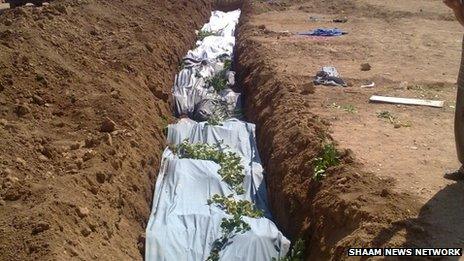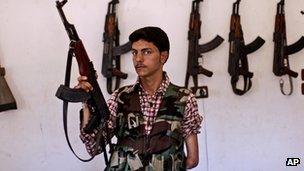Darayya deaths shocks Syrians
- Published

A pro-government TV report from Darayya shocked many Syrians, both for its content and its tone
Following reports by opposition activists that more than 300 people, many of them civilians, had been killed in Darayya, near Damascus, a journalist in the capital writes about the suburb's history of protest and the reaction among Syrians.
Many Syrians have been shocked by a report from Darayya broadcast recently by the pro-government TV station, al-Dunya.
Michelene Azar, a reporter for al-Dunya, was the first journalist to go into the small town south-west of Damascus, embedded with the Syrian army.
Her gruesome report showed graphic images of the bodies of men, women and children who had been shot.
As she moves along with her cameraman, she enters a graveyard where a woman is slumped against a headstone, clearly in need of emergency medical attention.
"What did the terrorists do to you?" she asks her, wanting to demonstrate the crimes the "armed groups" have committed in Darayya, as the government alleges.
Perhaps the most shocking part of the video is when Ms Azar interviews a four-year-old girl, who she finds leaning on the dead body of her mother in the back of a truck, as what appears to be the body of her young brother lies next to her.
After she describes the girl's situation, she turns to her to ask: "Who is this woman? Where were you going?"
Visibly scared and traumatised, the girl can only whisper: "My mother."
Many ordinary Syrians I spoke to were appalled by what happened in Darayya, but their anger was fuelled by al-Dunya's report. For many, it showed no mercy for the town's traumatised people, particularly the children.
Michelene Azar was keen to show the Syrian military helping out civilians, taking them for medical treatment and so on. But for the last week, Damascus residents have heard and sometimes seen the bombardment of Darayya from Mount Qassioun, which towers over the city.
Families in Darayya spent days in underground basements hiding from the shelling. When it finished, opposition activists accused the government of a massacre that left more then 200 people dead, including women and children like the ones shown in al-Dunya's report. The government says armed gangs were to blame.
Roses for bullets
The full story is yet to be revealed but Darayya is no stranger to protests and repression.
Back in 2003, a group of young men started a movement to clean up the streets of Darayya and raise awareness among people to fight corruption. The authorities detained 24 of them and 11 were sentenced to four years imprisonment.
When the protest movement against President Bashar al-Assad's rule came to Darayya, the town set a model for peaceful activism across the country.

The massacre in Darayya could drive more young Syrians from peaceful resistance to armed conflict
One of the main leading pro-democracy figures there was Ghaith Matar, a 26-year-old tailor who inspired the youth across Syria with his style of non-violent protest.
When the army entered Darayya in the summer of 2011, Matar was the first to come up with the idea of giving a Damascene rose and a bottle of water to the soldiers. Many towns and cities across Syria followed his model. But their roses were met with bullets.
In early September, Matar was killed. His body was disfigured and his throat was cut out by his attackers.
His 20-year-old wife was pregnant when he died. During the condolences, she was dressed in white long dress offering coffee to those who came to share her pain. Her pale face had a little smile, trying to hide her sadness.
His mother, in her fifties, held the prayer beads and welcomed every woman who came to give their condolences. She asked everyone if they would keep visiting, if they will come and support little Ghaith when he is born.
But today, life seems difficult for the little boy. His fellow infants have been killed, his relatives and probably neighbours were also lost.
With the latest raid on Darayya, many youth in Syria who followed in Ghaith's footsteps of peaceful protests may feel the only way to continue now is to join the armed resistance.